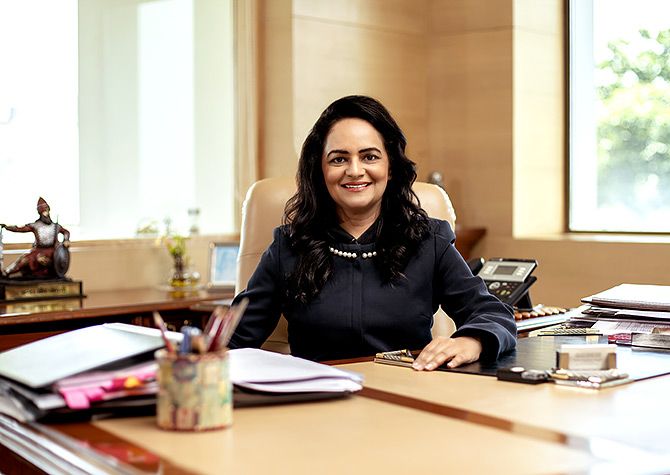'Stumbling blocks teach a lot and should be taken as stepping stones.'

Suchita Jain was 22 when she joined the Vardhman Group as a director in 1990.
She had to carry forward the legacy set by two generations of entrepreneurs, including her father S P Oswal, and also chart out her career path.
Within a year, she took over the fabric business, setting up its first plant in Himachal Pradesh.
Over the years, the London Business School graduate has turned every challenge into an opportunity and helped the Ludhiana-based textile firm grow into a billion dollar enterprise.
Today, the company exports yarn to nearly 75 countries, has established its presence in Punjab, Himachal Pradesh and Madhya Pradesh and employs more than 28,000 people.
There is a simple secret, says Suchita, for success in any field -- passion.
"You must have junoon (passion) for whatever you do," Jain tells Divya Nair/Rediff.com in an e-mail interview.
When you joined the company, what was the industry like?
When I joined the company, the country's economy had just opened up for foreign participation. There were vast changes for all businesses including ours.
The quota system (license raj) for organisations was gone. Businesses could import and export as much as they wanted to without prior approval from the government.
This presented opportunities for us. We thought of exploring new markets and it really worked for us. We export to more than 75 countries in significant quantities.
I was excited not only to bring in fresh ideas into the business and streamline some processes, but also take advantage of the opening up of the economy and forge global alliances for the company.
When you started, there were fewer women leaders. Was it challenging for you?
When I started my career, the business scenario was dominated by men. There were very few women in any industry.
That presented a challenge for me since many people in industry were not very comfortable dealing with a woman.
That has changed now and I am happy about it.
You are a third generation entrepreneur. Was it an advantage?
Being a third generation entrepreneur has both advantages and disadvantages.
The advantage is that you grow up with entrepreneurs and have the seeds of entrepreneurial instincts sown in you from the very beginning. You can better manage or run business when you dive into the ocean of entrepreneurship.
There are some disadvantages too.
You have to step into the shoes of your parents and not only do justice to the business, but also excel in it.
If you compare, I think the advantages far outweigh the disadvantages. The third generation entrepreneur is always more adept in dealing with business challenges and adversity.
What were the decisions you made that shaped the company where it is today?
After joining the Vardhman group, I have been instrumental in setting up of the woven fabric division.
This division has become the growth engine for the entire group. The woven fabric division has a capacity of more than 180 million metres annually. We export to almost all parts of the world.
The yarn and fabric business is a tightrope walk, a fine balance of fashion trends. The actual production of fabrics by the group is extremely important for success.
I have been very careful in reading fashion trends and aligning production according to prevailing trends.
How do you ensure that your company is safe and friendly for women employees?
The safety of women is of prime importance. Nothing will compromise our commitment towards the safety of women in the group.
The human resources department has been especially instructed that women are provided all facilities for safety.
We ensure that a cab is provided to women who work late.
Hostel facilities are provided to needy women staff.
As a result of the various women centric measures, more than 1,000 happy women work in our facility in Madhya Pradesh.
A recent report states over 80% Indian companies will face shortage of leaders, more so women leaders. Where are we going wrong? And what can we do about it?
It is unfortunate that in a country where over half the population is under 30, there is a shortage of leaders.
Many colleges are just producing graduates and not leaders.
There is bound to be a shortage of leaders when colleges are not preparing students for management or leadership roles.
There needs to be an alignment of the actual requirement of manpower by businesses and the course curriculum in colleges. There needs to be stricter control on the quality of education.
As regards to women, they have come a long way and are taking part in business activities and becoming leaders in the business fraternity, but a lot needs to be done.
They need to be encouraged not just by their parents when they are studying, but need acceptance by their peers when they are working.
What are the mistakes women make in their career?
It will not be entirely correct to say that women are going wrong in their careers or all women go wrong in their careers.
Women are charting their career paths and becoming known in their fields.
They are setting up many start-ups, leading their companies with panache.
The boards of many large companies today have women and they are handling critical responsibilities.
Women are quite innovative, doing the same thing in a different way than what their male counterparts have been doing and achieving better results.
Whatever career, field or industry, they are making a mark for themselves.
What have been some of your career learnings?
Commitment and attention to detail are extremely important for a project to succeed.
In any business or industry, one must be totally committed to the project for the task for it to bear fruit.
No entrepreneur can have her or his eyes set on two things at a time and yet be successful.
Any venture requires absolute commitment. Attention to details is required right till the last stage of a project.
You can get the best out of your colleagues when you appreciate them for all the good work or initiatives they come up with.
The best advice you received from your father S P Oswal.
Never to give up and to keep trying till the expected results are achieved.
There can be no letting go of anything that you have started until the desired result in achieved.
I never give up until the task is completed.
One cannot accept defeat in any task which s/he has set out to achieve.
I received this advice quite early in life from my father. It has been ingrained so steadfastly that not only do I practice it, but say the same thing to others.
India is currently facing a huge skill gap. What can youngsters and organisations do to bridge this gap?
Lift the standards of education in colleges and institutions.
There has to be better administration of colleges in the country so that students graduating from them are actually learning what is required to get employment.
The course curriculum in colleges needs to be aligned to the needs of industry.
While there is some degree of interaction between the student community and industries, there needs to be far more engagement between the two.
Colleges can arrange more visits of students to factories and have first-hand knowledge of business processes and requirements.
The course curriculum needs to be refreshed every now and then in tune with the changing requirements of industry.
How can India produce more entrepreneurs and job creators?
Of late, there has been a growing culture of startups in the country driven by young and energetic entrepreneurs.
These entrepreneurs are paving the path for themselves, solving some of the most intrinsic problems faced by society or consumers today.
India is already ranked among the top in terms of start-up culture. This can grow further with an advancement in entrepreneurship culture.
A subject on entrepreneurship can be introduced in colleges. Industry has to come forward and hand-hold entrepreneurs, guide them in their entrepreneurship journey.
Your message to young professionals.
Be true to your passion and never give up in times of adversity.
Take adversity as a challenge and make the most of it.
Stumbling blocks teach a lot and should be taken as stepping stones.
They should not be allowed to derail a project or the spirit of the person undertaking the task.
Always give back to society when you become successful.
There is no greater joy than sharing what you have with others, especially the underprivileged.
Look out for ways and means to pay back society.












 © 2025
© 2025